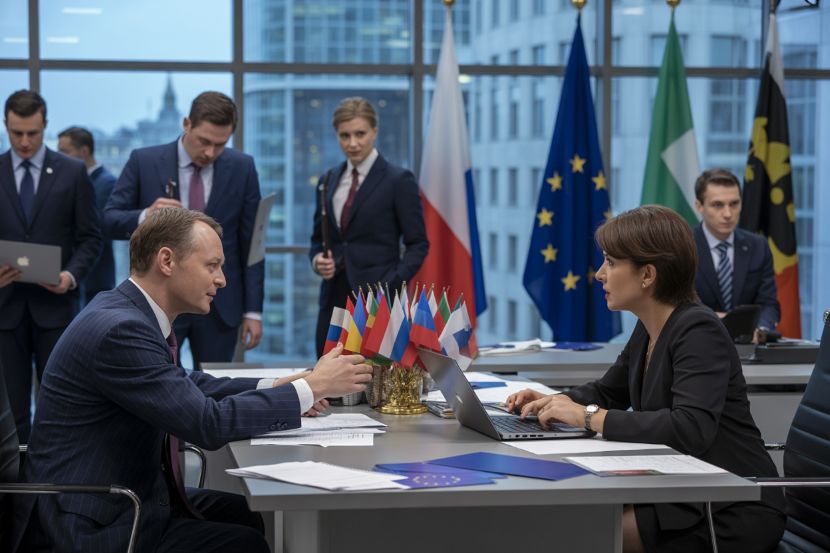European Union Limits Russian Diplomats’ Travel: What It Means for Business and Tourists
The European Union limits Russian diplomats' travel within the bloc, impacting international relations and travel. Find out how it affects business and tourism.
(This Image is AI Generated)
In response to ongoing geopolitical tensions, European Union governments have agreed to impose significant restrictions on the travel of Russian diplomats within the EU. This decision, which comes as part of broader diplomatic measures, seeks to limit the movement of Russian officials in the bloc. The new restrictions are designed to hinder the ability of Russian diplomats to freely engage in activities across Europe, particularly in light of the ongoing conflict in Ukraine and the broader international response to Russia’s actions.
According to reports from the Financial Times, the decision was reached after months of deliberations among EU member states. While Reuters has not yet independently confirmed the details, the move is set to have widespread implications for both diplomatic relations and the broader international travel landscape, including its impact on tourism and business operations.
Impact on Diplomatic Relations and International Travel
The travel restrictions, which are expected to severely limit the ability of Russian diplomats to operate within the European Union, signal a firm stance by the EU in response to Russia’s recent international activities. This move is likely to strain EU-Russian relations even further and could affect diplomatic efforts between the two entities.
For business travelers, especially those with operations or partnerships in Russia, the restrictions on diplomatic travel could present logistical challenges. Diplomatic staff often play a key role in facilitating business dealings between countries, so limiting their ability to engage with European counterparts could slow down negotiations, trade agreements, and overall international business. Companies with ties to Russian markets or businesses may face hurdles in conducting their affairs smoothly within the EU.
Implications for Tourism: What Travelers Need to Know
For regular tourists, the travel restrictions on Russian diplomats may not immediately alter their travel plans. However, there could be indirect effects on the tourism industry, particularly in countries that have high levels of Russian tourist arrivals. With these restrictions in place, diplomatic tension may affect travel advisories and security measures for travelers. Tourists planning trips to the EU may want to stay updated on any new regulations that could arise as a result of the diplomatic situation, particularly in relation to visa policies, border checks, and international flight operations.
Additionally, for tourists traveling between Russia and EU countries, it is essential to monitor changes in international flight routes, as heightened tensions could influence air travel schedules. A surge in political rhetoric and security measures might result in unexpected delays or cancellations, especially in sensitive border regions.
What This Means for International Diplomacy and Travel: A Closer Look
The travel restrictions also underline the shifting dynamics of global diplomacy, where travel and movement are often leveraged as tools in international relations. As the EU tightens travel restrictions on Russian diplomats, it may open the door for more stringent travel measures across the globe. Countries and organizations may follow the EU’s lead, establishing similar travel bans or restrictions on diplomats from other countries involved in controversial international actions.
This is a reminder that tourism and business are deeply intertwined with global diplomacy. Even minor shifts in diplomatic relations can cause ripple effects across the travel industry, impacting everything from airfare to hotel availability, and ultimately, the experience of travelers.
Step-by-Step Guide for Travelers: How to Navigate These Changes
- Stay Informed on Travel Advisories: Ensure that you are up to date on any travel restrictions or advisories related to both Russia and EU member states. Official sources like the European Commission or foreign ministries will provide timely updates on changing regulations.
- Check for Flight and Visa Updates: If you’re traveling between Russia and the EU, verify that your flight is operational and confirm that your visa is valid. Restrictions on diplomatic movement could also affect visa processing times or requirements.
- Plan for Potential Travel Delays: Be prepared for potential delays at borders, airports, or immigration checkpoints due to increased security measures. Expect heightened scrutiny on certain routes or regions affected by the restrictions.
- Adjust Business Travel Plans: For those with business dealings or meetings involving Russian diplomats or government officials, consider the impact of these restrictions on your agenda. Look into alternative methods for conducting meetings, such as virtual platforms or rescheduling meetings in neutral countries.
- Monitor EU Security Policies: Travel to certain countries within the EU might become more complicated as security policies tighten. Ensure that you have access to the latest information on border control changes, particularly in relation to diplomatic tensions.
Key Points to Note:
- EU governments have agreed to impose travel restrictions on Russian diplomats, limiting their movement within the bloc.
- The decision is a direct response to Russia’s geopolitical actions, particularly related to Ukraine.
- Business travelers with Russian connections may face challenges in carrying out operations and negotiations.
- Tourists should stay informed about potential changes to travel advisories, visa policies, and border control procedures in response to the new restrictions.
- Tourism and business sectors are interconnected, and shifts in diplomatic relations could cause ripple effects in travel operations.
The post European Union Limits Russian Diplomats’ Travel: What It Means for Business and Tourists appeared first on Travel and Tour World


Comments and Responses
Please login. Only community members can comment.